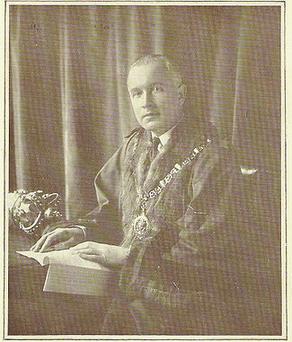Roland Gwynne
(soldier, lawyer) | |
|---|---|
 | |
| Born | 16 May 1882 |
| Died | 15 November 1971 (Age 89) Sussex, UK |
| Nationality | UK |
| Alma mater | Trinity Hall (Cambridge) |
Patient, close friend, and probable lover of the suspected serial killer Dr John Bodkin Adams. | |
Lieutenant-Colonel Sir Roland Gwynne was Mayor of Eastbourne, Sussex, from 1928 to 1931. He was also a patient, close friend, and probable lover of the suspected serial killer Dr John Bodkin Adams.
Childhood
Gwynne's father made a fortune in the nineteenth century from an engineering business, Gwynnes Limited, and bought estates in Sussex with the proceeds. Gwynne's mother, May, was 41 when he was born. He was the last of nine children (though two had died). Until the age of 13, he was dressed by his mother as a girl in frocks, with bows, necklaces and long ringlets.[1] He was educated privately before being sent to Trinity Hall, Cambridge.
The renowned harpsichordist Violet Gordon-Woodhouse was one of his sisters. One brother, Rupert, was Member of Parliament for Eastbourne from 1910 until his death in 1924; the celebrated cookery writer Elizabeth David was a daughter of Rupert.
His mother's great-grandfather was Dutch and great-grandmother was a Sumatran.[2]
Career
After university he was in the honorary post of Judge's Marshal. On 2 April 1904 he was commissioned to Second Lieutenant in the Sussex Yeomanry[3] and made Lieutenant on 1 April 1908.[4] In 1904 Gwynne aided Viscount Turnour in his maiden election campaign in the constituency of Horsham, which Turnour then held for the next 47 years.[5] In 1910 Gwynne was called to the Bar at the Inner Temple, where he practised in the Probate and Divorce Division.[6]
The First World War broke out when Gwynne was 32. He was sent a white feather, a symbol of cowardice, by a "friend of the family"[1] and in September 1916 he volunteered for active service. He won the Distinguished Service Order in Flanders in 1917 while attached to the Queen's Royal Regiment, much to the surprise of his family. He was wounded twice, leaving him with a permanent limp.
On 8 April 1921, he was made a Deputy Lieutenant of Sussex.[7] In 1922, his mother died, leaving most of her money to Gwynne due to a family disagreement. That same year, Gwynne put his name forward as a Conservative candidate for Lewes, but withdrew it when his brother Neville hinted to the selection committee that Gwynne was a homosexual (around this time MP Noel Pemberton Billing was leading a witch hunt against homosexuals). John Bodkin Adams arrived in Eastbourne that same year.
Rupert died in 1924, just after being re-elected to Parliament. Gwynne inherited his estate, but settled for local politics, being High Sheriff of Sussex in 1926/27 and then mayor of Eastbourne in 1928.[6] While he was mayor, in 1929 the town bought 4,000 acres (1,600 ha) of land surrounding Beachy Head, to save it from development, costing the town around £100,000.[8]
His term as mayor ended in 1931. On 9 November that year, he was made the 8th ever Honorary Freeman of Eastbourne for his services to the borough. He stayed in local politics, being Chairman of the East Sussex County Council from 1937 to 1940.[6]
He constantly had financial problems, caused on the one hand by his extravagant lifestyle (he was famous for the wild parties he held at Folkington Manor, attended by, among others, The 1st Marquess of Willingdon, who had was previously both Governor General of Canada and Viceroy of India, and Rudyard Kipling) and on the other, by his sexuality, which made him a prime target for blackmail. Indeed, his butler Wilde was known by those close to him to be one such person extorting money from him.[9] After Gwynne's death, love letters from various local jockeys were found among his papers.[1]
During the Second World War, he became addicted to alcohol.[1]
In 1947, burdened with debt, he was forced to rent out Folkington and move into the smaller Wootton Manor.
John Bodkin Adams
Gwynne never married but he developed a close friendship with Dr John Bodkin Adams, an unmarried Eastbourne general practitioner and suspected serial killer, with whom he went on frequent shooting holidays to Scotland and Ireland. He would visit Adams every morning at 9 a.m.[1]
During the police investigation into Adams, a note written by a journalist was uncovered linking Adams sexually to a member of the local police and a local magistrate. The police officer is strongly suspected to have been the Deputy Chief Constable of Eastbourne, Alexander Seekings, and the magistrate to have been Gwynne. Despite the illegality of homosexual sex in 1956/57, the matter was not investigated further by police.[1]
In 1956, Adams was arrested on suspicion of murdering two of his patients. At that time Gwynne was Chairman of the Magistrates in Lewes, East Sussex, and had to step down from the committal hearing owing to a conflict of interest.
On 12 February 1957, just before Adams' trial began,[10] Gwynne was knighted.
References
- ↑ a b c d e f Cullen, Pamela V., "A Stranger in Blood: The Case Files on Dr John Bodkin Adams", London, Elliott & Thompson, 2006,
- ↑ Cooper, Artemis (1999). Writing at the Kitchen Table. London: Michael Joseph. pp. 4–6
- ↑ London Gazette
- ↑ London Gazette
- ↑ The Sussex County Magazine
- ↑ a b c Ken Good, The House of Gwynne, Bookmarque Publishing 2002
- ↑ London Gazette
- ↑ The Times, 30 October 1929. p. 11
- ↑ Cooper, Artemis (2000), Writing at the Kitchen Table, HarperCollins, p. 266,
- ↑ London Gazette